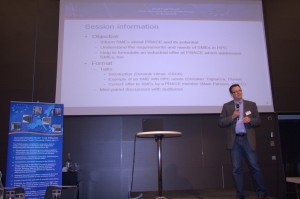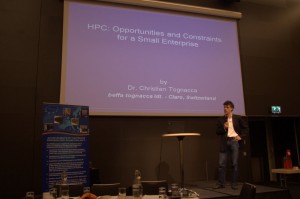Conference Report: PRACE Executive Seminar on Industrial Usage of HPC Services
Switzerland was represented at the «Executive Seminar on Industrial Usage of World-Class HPC Services» (March 28-29, 2011, Stockholm, Sweden) by CSCS and Christian Tognacca, partner of the company «beffa tognacca Ltd.». The seminar was designed for CIOs, CTOs and R&D managers, responsible for designing, deploying and operating computing and data management infrastructures, or depending thereupon for the success of their enterprises.
A major discussion topic of the conference was how to provide access to HPC to industry and in particular to Small and Medium Enterprises (SME). Dominik Ulmer (CSCS) moderated the round table «HPC access for SMEs» with Christian Tognacca contributing to the discussion.
beffa tognacca is a highly specialised small enterprise active in the fields of hydraulics, hydrology, river mechanics and morphology, natural risk analysis and protection against natural hazards. The company is composed of three collaborators, one of whom has a master’s degree in engineering and the two other individuals have a PhD from ETH Zurich. The enterprise has a very strong link to the university and research worlds, and one of the two owners is still teaching at ETH in Zurich.
Dominik Ulmer, CSCS
Christian Tognacca, beffa tognacca Ltd.
In the introduction to the round table, Christian Tognacca explained how his activities are strongly dependent on the expertise and know-how of his team, but also on the numerical simulation tools they improve within the frame of their consultancy projects. The necessity to keep developing and improving these numerical tools is given by the increasing needs and expectations of the clients (both public and private) but also by their wish and ambition to further increase the possibility of better understanding and describing natural phenomena.
According to Tognacca, the opportunity to use the computational resources of HPC could help his enterprise to further improve its competitiveness, but also to give a contribution to scientific progress in general. beffa tognacca already got in touch with CSCS and Università della Svizzera Italiana (USI) in order to define the possibilities to improve the capabilities of the numerical simulation tools (e. g. code parallelisation). They found both CSCS and USI to be very interested and open partners. Tognacca regrets that no collaboration could start until now, especially because it is difficult for a small firm to allocate the necessary resources (especially time) to development projects that are not business critical. Regular daily activities do not allow a small company to invest much more time in research and development work.
During the round table, additional industry and HPC computer centre representatives contributed to the discussion with their experience in how to provide access to HPC to SMEs.
At the end of the round table Dominik Ulmer summarised the discussion as follows: «The importance of SME to innovation in Europe has been confirmed. A primary goal for PRACE has to be to provide access to HPC to these companies. A SME is more interested in Tier-2 and in «Desktop HPC» than to Tier-0 and 1 resources. Already the ability to use a desktop computer with a couple of GPUs (or a Tier-1 resource) will give most SME a competitive advantage of many years. Hence a PRACE offer for industry should not focus only on access to Tier-0 resources but should also address the necessary know-how for using much smaller systems.»
Ulmer pointed out different obstacles that make it difficult for SME (but also to industry in general) to access HPC resources: HPC centres traditionally require competition on the basis of scientific quality and they don’t have a business model for industrial use by SMEs. In addition HPC centres traditionally don’t have strong security models that can be an important requirement for innovative companies. Also the commercial software packages used by SME often do not scale, or adapt very slowly to new HPC architectures.
Finally, innovative business and founding models for the technological transfer between HPC centres and SME have to be developed.



